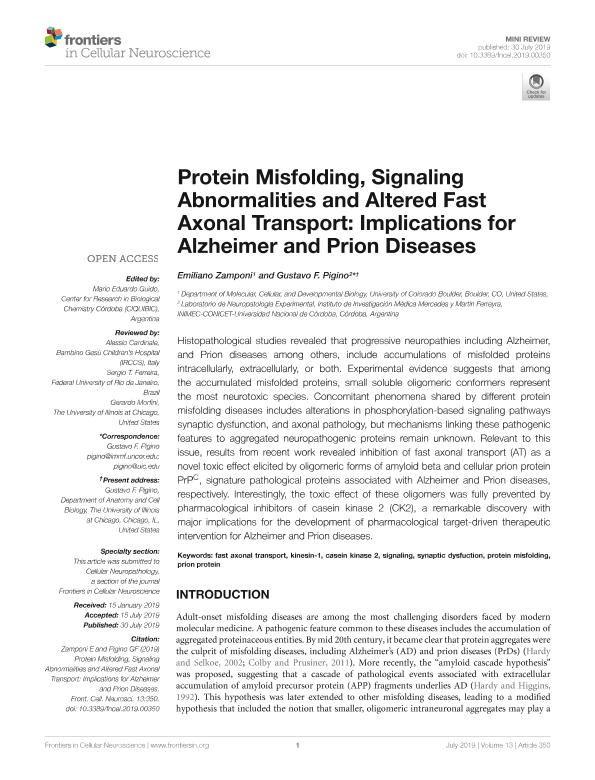Mostrar el registro sencillo del ítem
dc.contributor.author
Zamponi, Emiliano

dc.contributor.author
Pigino, Gustavo Fernando

dc.date.available
2021-03-16T20:57:23Z
dc.date.issued
2019-07
dc.identifier.citation
Zamponi, Emiliano; Pigino, Gustavo Fernando; Protein misfolding, signaling abnormalities and altered fast axonal transport: Implications for Alzheimer and Prion diseases; Frontiers Media S.A.; Frontiers in Cellular Neuroscience; 13; 7-2019; 1-5
dc.identifier.uri
http://hdl.handle.net/11336/128428
dc.description.abstract
Histopathological studies revealed that progressive neuropathies including Alzheimer, and Prion diseases among others, include accumulations of misfolded proteins intracellularly, extracellularly, or both. Experimental evidence suggests that among the accumulated misfolded proteins, small soluble oligomeric conformers represent the most neurotoxic species. Concomitant phenomena shared by different protein misfolding diseases includes alterations in phosphorylation-based signaling pathways synaptic dysfunction, and axonal pathology, but mechanisms linking these pathogenic features to aggregated neuropathogenic proteins remain unknown. Relevant to this issue, results from recent work revealed inhibition of fast axonal transport (AT) as a novel toxic effect elicited by oligomeric forms of amyloid beta and cellular prion protein PrPC, signature pathological proteins associated with Alzheimer and Prion diseases, respectively. Interestingly, the toxic effect of these oligomers was fully prevented by pharmacological inhibitors of casein kinase 2 (CK2), a remarkable discovery with major implications for the development of pharmacological target-driven therapeutic intervention for Alzheimer and Prion diseases.
dc.format
application/pdf
dc.language.iso
eng
dc.publisher
Frontiers Media S.A.
dc.rights
info:eu-repo/semantics/openAccess
dc.rights.uri
https://creativecommons.org/licenses/by-nc-sa/2.5/ar/
dc.subject
CASEIN KINASE 2
dc.subject
FAST AXONAL TRANSPORT
dc.subject
KINESIN-1
dc.subject
PRION PROTEIN
dc.subject
PROTEIN MISFOLDING
dc.subject
SIGNALING
dc.subject
SYNAPTIC DYSFUCTION
dc.subject.classification
Biología Celular, Microbiología

dc.subject.classification
Ciencias Biológicas

dc.subject.classification
CIENCIAS NATURALES Y EXACTAS

dc.title
Protein misfolding, signaling abnormalities and altered fast axonal transport: Implications for Alzheimer and Prion diseases
dc.type
info:eu-repo/semantics/article
dc.type
info:ar-repo/semantics/artículo
dc.type
info:eu-repo/semantics/publishedVersion
dc.date.updated
2020-11-19T21:17:16Z
dc.identifier.eissn
1662-5102
dc.journal.volume
13
dc.journal.pagination
1-5
dc.journal.pais
Suiza

dc.journal.ciudad
Lausanne
dc.description.fil
Fil: Zamponi, Emiliano. Consejo Nacional de Investigaciones Científicas y Técnicas. Centro Científico Tecnológico Conicet - Córdoba. Instituto de Investigación Médica Mercedes y Martín Ferreyra. Universidad Nacional de Córdoba. Instituto de Investigación Médica Mercedes y Martín Ferreyra; Argentina
dc.description.fil
Fil: Pigino, Gustavo Fernando. Consejo Nacional de Investigaciones Científicas y Técnicas. Centro Científico Tecnológico Conicet - Córdoba. Instituto de Investigación Médica Mercedes y Martín Ferreyra. Universidad Nacional de Córdoba. Instituto de Investigación Médica Mercedes y Martín Ferreyra; Argentina
dc.journal.title
Frontiers in Cellular Neuroscience
dc.relation.alternativeid
info:eu-repo/semantics/altIdentifier/url/https://www.frontiersin.org/article/10.3389/fncel.2019.00350/full
dc.relation.alternativeid
info:eu-repo/semantics/altIdentifier/doi/http://dx.doi.org/10.3389/fncel.2019.00350
Archivos asociados
